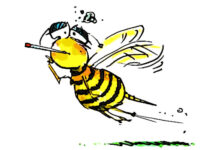The French NGO Pollinis, which has been fighting against the extinction of bees and other pollinating insects for 12 years, is promoting a petition to ask for transparency in decision-making processes and guaranteed access to the documents of the SCoPAFF (Standing Committee on Plants, Animals, Food and Feed), the technical committee which, among other things, decides on the approval of pesticides harmful to bees. (1)
1) SCoPAFF, the opacity of decisions on pesticides
The SCoPAFF is ‘a technical committee where anonymous representatives of the EU Member States’ agriculture ministries vote behind closed doors on authorisations (and their renewals for many years) for the placing on the market of pesticides toxic to bees, under the influence of agrochemical lobbies’, denounces the NGO Pollinis.
The deliberations and votes of the SCoPAFF technical committee are kept secret. This prevents citizens from knowing whether their country voted in favor of authorizing this or that pesticide and on what basis. In addition to favoring the pesticide, herbicide and fungicide industry, which benefits from the secrecy of institutional processes.
2) The necessary toxicity test on bees
A crucial element in the authorization of pesticides should be their toxicity towards bees. For this purpose in 2013 EFSA had created a protocol for the evaluation of substances capable of verifying their impact on pollinators.
The bee test provided for a green light for agrotoxins (neonecotinoids) with the ability to kill ‘only’ 7% of insects. But this test was never carried out, following negotiations conducted behind closed doors that led to its shelving, in 2019, without explanation.
3) Pollinis, legal action for transparency against the Commission
Who decided what? To find out, Pollinis requested access to several documents related to the positions and votes within the SCoPAFF committee. And after several denials by the European Commission, the NGO launched legal action in June 2020.
The European Commission, sentenced at first instance in September 2022 by the EU court, was forced to comply with the sentence and deliver the requested documents to the NGO. Only to then appeal against the first instance decision.
4) Pollinis’ investigation
Pollinis– thanks to the documents thus obtained – carried out a thorough investigation to solve the mystery of the exclusion of the test on bees from the authorisation and renewal procedures for pesticides. (2)
It emerges that Member State representatives have joined the agrotoxics industry in considering EFSA’s ‘bees test’ overly ‘restrictive’, in its aim to protect the pollinating insects on which agriculture itself depends.
5) New carousel ride
Meanwhile EFSA, in 2023, defined a new bees test. In this version, the mortality rate – linked to exposure to a pesticide – considered acceptable for a colony of honey bees increased from 7% to 10%. (3)
EFSA’s document is now being discussed in the opaque SCoPAFF. Once again behind closed doors, without any sharing with civil society. So that no one knows who privileges the agrotoxic business ‘whatever it takes’. (4)
Lets all sign the Pollinis’ petition!
Marta Strinati
Footnotes
(1) Soutenez l’action en justice de Pollinis! https://mobilisation.pollinis.org/desarmons-les-lobbys/
(2) L’agrochimie contre les abeilles. Pollinis https://tinyurl.com/mwc8crhu
(3) Revised guidance on the risk assessment of plant protection products on bees (Apis mellifera, Bombus spp. and solitary bees). EFSA Journal. 11.5.23 https://doi.org/10.2903/j.efsa.2023.7989
(4) In SCoPAFF, the sort of beauties should be decided on a new one in the closet. Pollinis. 9.10.24. https://tinyurl.com/5xzw49fy
Professional journalist since January 1995, he has worked for newspapers (Il Messaggero, Paese Sera, La Stampa) and periodicals (NumeroUno, Il Salvagente). She is the author of journalistic surveys on food, she has published the book "Reading labels to know what we eat".








